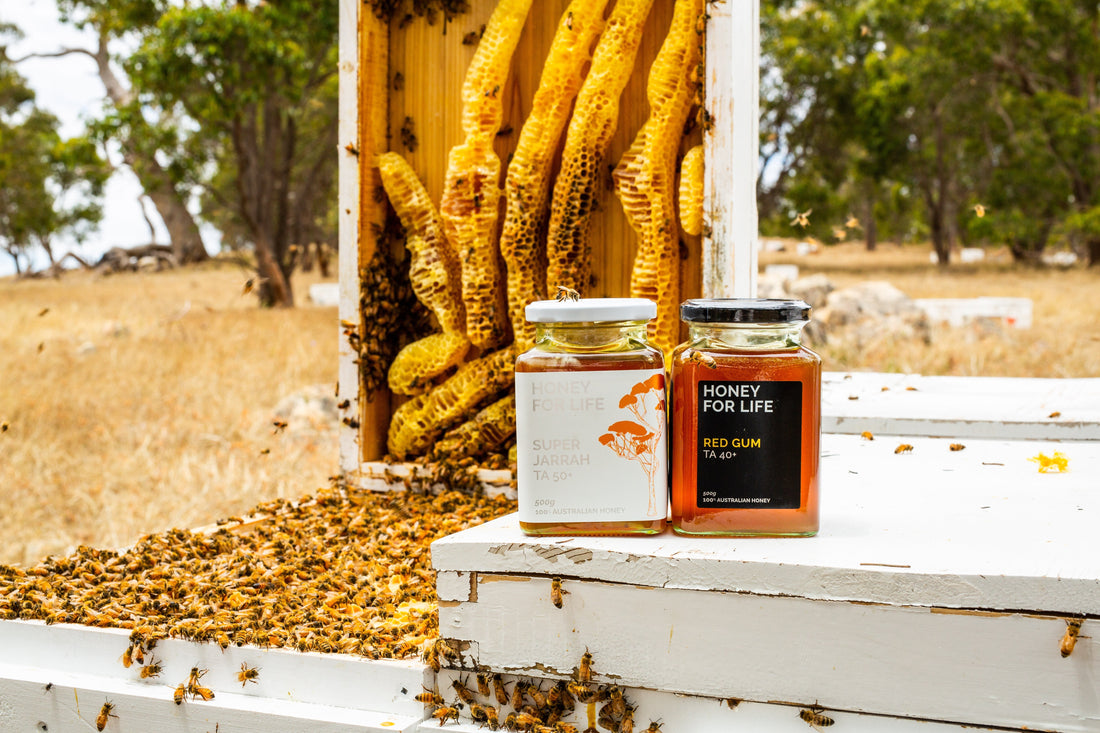
The Role of Bees in Biodiversity and Honey Production
The Role of Bees in Biodiversity and Honey Production
Bees are among the most important creatures on our planet. These small yet mighty pollinators play a crucial role in supporting biodiversity, maintaining healthy ecosystems, and ensuring the production of many of the foods we rely on daily. Without bees, our landscapes and food supply would be drastically different.
At Honey for Life UK, we are passionate about not only providing high-quality honey but also advocating for bee conservation and sustainable beekeeping. In this guide, we explore the essential role of bees in biodiversity, the pollination process, ethical honey production, threats to bee populations, and what we can do to help.
Bees and Their Role in Biodiversity
Biodiversity – the variety of life on Earth – depends heavily on pollinators like bees. As they travel from flower to flower collecting nectar, bees transfer pollen, allowing plants to reproduce. This process supports the growth of trees, flowers, and crops, forming the foundation of countless ecosystems.
How Bees Contribute to Biodiversity
● Pollination supports plant diversity, ensuring thriving forests, meadows, and hedgerows.
● Many wild plants rely on bees for reproduction.
● Bees provide food for other species, as the fruits, seeds, and plants they pollinate sustain countless animals, from birds to small mammals.
● Healthy bee populations contribute to resilient ecosystems, preventing habitat collapse.
By protecting bees, we are preserving the natural balance of life on Earth.
Pollination: The Lifeline of Food Production
Bees are responsible for pollinating around 75% of global food crops. Without their hard work, many of the foods we take for granted – including apples, berries, nuts, and tomatoes – would be scarce or disappear entirely.
Why Pollination Matters for Our Food Supply
● Increases crop yields, with farmers seeing significantly higher production rates.
● Improves food quality, as crops pollinated by bees are often larger, tastier, and more nutritious.
● Supports the economy, with pollinators contributing over £690 million annually to UK agriculture.
Without pollinators, food prices would rise, and many nutritious fruits and vegetables would become luxury items.
The Honey Production Process: Ethical and Sustainable Beekeeping
At Honey for Life UK, we believe in ethical and sustainable honey production that prioritises both the well-being of bees and the environment. Honey is a natural byproduct of the hard work of bees, and responsible beekeeping ensures they remain healthy while sharing their golden nectar with us.
How Bees Make Honey
- Worker bees gather nectar from flowers and store it in their honey stomachs.
- Back at the hive, bees pass nectar between each other, reducing moisture and adding enzymes to transform it into honey.
- Bees deposit honey into wax combs, sealing them with beeswax once the moisture content is right.
- Beekeepers harvest excess honey, ensuring enough is left for the hive’s survival.
What is Ethical Beekeeping?
● Minimal honey harvesting to ensure bees keep enough honey to sustain themselves through winter.
● No harmful chemicals, with sustainable apiaries avoiding pesticides and antibiotics that can harm bees and their environment.
● Protecting natural habitats by supporting wild bee populations and planting bee-friendly flowers.
By choosing honey from responsible producers, we can enjoy its natural benefits without harming pollinators.
Threats to Bee Populations in the UK
Despite their importance, bees face numerous challenges that threaten their survival. From habitat loss to climate change, these vital pollinators are under increasing pressure.
Major Threats to Bees
● Climate change, with rising temperatures and unpredictable weather affecting flowering cycles and bee populations.
● Pesticides and chemicals that weaken colonies and reduce their ability to pollinate.
● Loss of wildflowers and natural habitats due to urbanisation and intensive farming.
● Colony Collapse Disorder (CCD), where entire bee colonies disappear due to environmental stressors and disease.
With over 35 species of bees at risk in the UK, protecting them has never been more critical.
How You Can Support Bees and Biodiversity
Protecting bees doesn’t require grand gestures – small, everyday actions can make a big difference.
Bee-Friendly Gardening Tips
● Plant more flowers, especially bee-friendly varieties like lavender, bluebells, foxgloves, and thyme.
● Avoid pesticides by using natural alternatives in your garden.
● Provide water sources, such as a shallow dish of water with pebbles to keep bees hydrated.
● Let your lawn grow wild to allow natural wildflowers to bloom.
Support Local Beekeepers & Ethical Honey Brands
Buying raw, responsibly sourced honey supports sustainable beekeeping. Look for local honey producers who prioritise ethical practices.
● Buy raw, unprocessed honey that retains more nutrients and supports small-scale beekeepers.
● Support farmers who promote biodiversity through organic and regenerative farming.
● Raise awareness by sharing knowledge about bee conservation with friends, family, and online communities.
Every effort counts in ensuring that bees – and the ecosystems they support – continue to thrive.
Ethical Choices Make a Difference
Bees are the backbone of biodiversity, food production, and sustainable agriculture. Without them, our natural world and food supply would be in serious jeopardy. By making conscious choices – supporting ethical beekeeping, planting bee-friendly gardens, and reducing pesticide use – we can help protect these vital pollinators.
At Honey for Life UK, we are committed to sustainable honey production and bee conservation. By choosing our ethically sourced honey, you're not just enjoying nature’s sweetest gift, you’re also supporting the health of our planet.
Join us in protecting the bees – one jar of honey at a time.